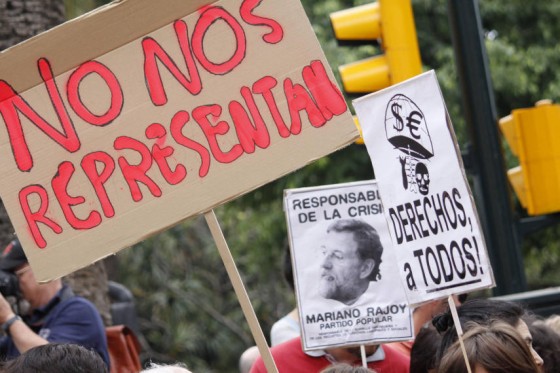Anti-politics: Elephant in the room
‘They don’t represent us’ —Spanish Indignados protest
By ELIZABETH HUMPHRYS & TAD TIETZE
At a certain point in their historical lives, social classes become detached from their traditional parties. In other words, the traditional parties in that particular organisational form, with the particular men who constitute, represent, and lead them, are no longer recognised by their class (or fraction of a class) as its expression.
—Gramsci (1971), Selections From The Prison Notebooks, p. 210
If the ruling class has lost its consensus, i.e. is no longer “leading” but only “dominant”, exercising coercive force alone, this means precisely that the great masses have become detached from their traditional ideologies, and no longer believe what they used to believe previously, etc. The crisis consists precisely in the fact that the old is dying and the new cannot be born; in this interregnum a great variety of morbid symptoms appear.
—ibid, pp. 275-6
In this post we will try to clarify what we mean by “anti-politics”, and how this fits in a wider analysis of the crisis of politics that Left Flank has been developing since we started. Our analysis has moved on somewhat from pieces like this one in 2010, and we think it is worth acknowledging shifts in our analysis. Various responses to Russell Brand’s attack on the political system, and discussion here and on social media, have encouraged us to try to put our thoughts about “anti-politics” in one place. We apologise in advance for the abbreviated and schematic nature of what follows.
The starting point for understanding why Brand’s intervention struck such a chord is the crisis of representation that leads most people to see politics as completely detached from their lives. Crucially, this detachment is not caused by the political class being less “representative” of their social base than in some previous era; rather, its lack of a social base makes the political class’ actual role in representing the interests of the state within civil society more apparent.
Despite purporting to represent the “general interest” of society, the state has interests separate from and opposed to those of the civil society on which it is founded, relying on a mixture of coercion and consent to maintain its rule. In Gramsci’s terminology the state and political society “enwrap” civil society, reshaping and incorporating resistance from below (this conception of “an integral state” provides the theoretical basis of Liz’s PhD research).
Under capitalism the ruling class doesn’t directly govern; there is an apparent separation between economics (relations of production / class exploitation) and politics (organised around the state, with its political class, and resting on apparent equality of citizens reflecting equality of exchange in the market). This creates the appearance of representation, one that masks the underlying social relations of domination. It is this appearance that is now breaking down.
It follows from this that parties representing subaltern (exploited/oppressed) social groups are always contradictory phenomena. They both articulate subaltern groups’ interests in relation to the state and incorporate them into reproducing the system. One way to think about it is of politics as a “container” in which social movements are limited from above, but which also provides a structure into which resistance can be channeled from below.
The hollowing out of such political structures provides the social basis for the greater prominence of anti-politics. We won’t repeat Left Flank’s analysis of the period after the end of the post-WWII boom, except to note that the attempts by political elites to resolve the crisis of the 1970s via a “neoliberal” political project failed to provide a sustained resolution of those problems. In Australia this was especially acute because the central national political arrangement around Laborism reached its peak of influence in the Accord, which drove through the neoliberal project and thereby signed its own suicide note. The result has been the exhaustion of the old politics, but without a stable and confident new arrangement able to be implemented. This has happened across a wide range of advanced capitalist countries (hence Brand’s anti-politics can have resonance internationally), although local manifestations vary.
So what is this anti-politics? We think three things, which are interrelated:
A widespread mood among ordinary people related to Gramsci’s description of “detachment”. This can manifest in spontaneous popular outbursts or be reflected in volatile electoral results, but tends to peter out if not given some kind of direction. To put Brand’s intervention into context, all he has really done is state this obvious fact, to point to the elephant in the room, that the political elite would rather have hidden behind claims it is “representative”.
A political strategy by sections (or aspiring sections) of the political class, drawing on this mood for support. There are lots of variants on this, not confined to Left or Right: Bob Brown, Kevin Rudd, and Clive Palmer have all appealed to anti-politics in Australia, while UKIP, Beppe Grillo, and the people who led the early phases of the 15M (Indignados) movement across the Spanish state are overseas examples. In each case the limited nature of their anti-politics (few actually want to destroy politics altogether) means that these represent limited challenges to the existing order and often fall back into being “just like the other politicians” or collapse into moralistic opposition to the status quo.
A consistent strategy of social revolution, which seeks to concretely intervene on the effective terrain in order to build a movement that overcomes politics by overcoming the state. This is “communism” as the end of politics (as Engels put it, when “the government of persons is replaced by the administration of things”), a real movement that is a simultaneously theoretical and practical critique of politics, not simply replicating the inner logic of capitalist politics for different ends.
Critical responses to Brand’s anti-politics have come from across the political spectrum. Some are little more than snide attempts to dismiss the substance of what he has argued, for example claiming that his privilege and fame disqualify him from speaking for the disenfranchised majority (because, presumably, privilege and fame only qualify you to defend the political system). Others claim that Brand’s criticisms of politics is tantamount to an attack on democracy and licenses a descent into mob rule, or even places him on the slippery slope to fascism.
A more serious argument from within the broader Left has been to acknowledge the failings of the political system, but to argue that the problem is that there are not enough people like Russell Brand on the inside, working to transform it. Yet if politics was somehow healthier three decades ago when large swathes of the sixties generation of radicals entered it to change things and we ended up with what is happening now, it seems at best naïve to encourage today’s anti-capitalists inside the tent as if this will produce a better result.
But it is among some on the Marxist Left that the most troubling response has emerged. On the one hand this response welcomes Brand’s attack on “conventional” or “official” politics. But on the other it suggests that what is needed is to build a different, “unconventional”, “radical” or even “revolutionary” politics instead. In August, Tad wrote of such radical Left responses to the hollowing out of politics:
The result is a tendency to see the Left’s prospects as dismal, because the official Left’s decay is seen as proof of the limited possibilities for a more radical politics. And the crisis of official politics is therefore seen — paradoxically — as a negative rather than an opportunity.
Others describe the current context as “depoliticisation”. We don’t think this is helpful. To understand why it is problematic, let’s ask what “repoliticisation” would mean. Clearly something more than simply “people getting involved” is implied. What we have lost is in fact the mystified appearance that actually existing politics was “representative”, predicated on the hollowing out of the institutional structures that supported such an illusion. Is this really what we want to revive?
The demands that issue from such a view involve a kind of nostalgia for political institutions from a previous era — “we need strong unions”, “we need a rank-and-file movement”, “the ALP Left should fight for better policies”, “we need a strong parliamentary Left”, “we need more grassroots control of Labor and the Greens”, etc. The contradictory nature of these political forms — their historic role in constraining the social interests of subaltern groups — is downplayed in favour of wishing for their return. Such arguments are particularly odd in Australia, where the highpoint of the union movement’s institutional influence was during the Accord process that delivered full-blown neoliberalism to the working class. So while neoliberalism did undermine the strength of unions in Australia, as Liz has argued, and this represented a significant political defeat for the working class, it was achieved through a consensual project that the unions helped run. This points to the impasse of the institutional Left, as much as any victory by the Right.
More: https://left-flank.org/2013/10/31/anti- ... hant-room/








